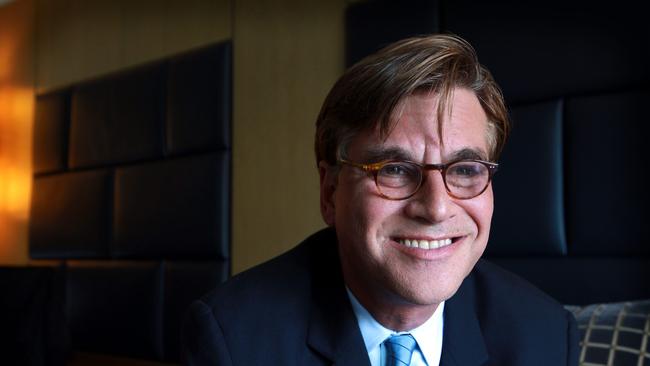Steve Jobs: Apple chief’s ruthless side focus of Hollywood films
Apple chief Steve Jobs’s reputation gets a mauling in hotly-anticipated films about the visionary’s dark side.

In life he was celebrated for pulling off the “greatest second act” in business history after his triumphant return to Apple rescued the company from bankruptcy, and transformed our relationships with computers, music and mobile phones.
Now, four years after Steve Jobs’ death, two new films with Oscar-laden pedigrees are subjecting his character to a similar re-evaluation, emphasising a ruthlessness and lack of empathy underpinning those visionary achievements.
Both draw on extensive interviews with people at the heart of Jobs’ professional and personal lives. Together they are likely to significantly alter public perceptions of a man who remains widely revered as a hero for bringing the iMac, iTunes, iPad and iPhone into the world.
The biggest film at the New York and London Film Festivals next month is Steve Jobs, starring Michael Fassbender as the enigmatic, Zen-influenced chief executive. It is scripted by Aaron Sorkin, writer of The West Wing and directed by Danny Boyle who made Slumdog Millionaire.
Steve Wozniak, Apple’s co-founder was consulted on the film. He said that it is a “stellar” accomplishment that gets audiences closer than they have ever been to the private Steve Jobs.
He said that he felt he was “seeing the real Steve Jobs in there”, having previously criticised earlier depictions such as Ashton Kutcher’s ridiculed portrayal in the 2013 film Jobs.
Variety’s review said that Fassbender “completely owns the screen” even though his character is “very unlikeable throughout.”
In the opening section of the film, Jobs is confronted by his high-school girlfriend, Chrisann Brennan, just as he is about to go on stage for one of Apple’s vaunted launches.
Ms Brennan is shown lambasting Jobs for failing to support her and their daughter Lisa Brennan-Jobs - who Jobs refused to acknowledge even after a paternity test, and whom he reportedly once refused to pay $500 in monthly child support at a time when his company was worth $200 million.
The Hollywood Reporter’s critic said that while the device might seem “pretty unrealistic, even forced” it works because it helps to illuminate the dark side of his genius, the “overweening ambition, massive self-confidence, ultra-demanding posture, lack of compassion and overriding egomania” that made Jobs who he was.

Sorkin, who won an Academy Award in 2011 for The Social Network - his screenplay about the birth of Facebook - has said that there’s “no point writing about someone unless they’re flawed”.
Early in the writing process, he told an audience that he had met people close to Jobs, such as Apple’s co-founder Steve Wozniak, and that “these people revere him, despite the fact that he made all of them cry at one point”.
Boyle’s film earned largely rave reviews following the screening of a “work in progress” cut nine days ago at the Telluride Film Festival in Colorado.
It follows the release of a searing new documentary, Steve Jobs: The Man in the Machine, made by Alex Gibney, who won an Academy Award for the Afghanistan conflict documentary Taxi to the Dark Side.
Currently on cinema release in America, Steve Jobs: The Man in the Machine debuted earlier this month at No. 9 on iTunes’ movies chart, despite Apple giving it no promotion at all. Apple’s software chief Eddy Cue described it as an “inaccurate and mean-spirited view of my friend”, although Mr Wozniak said that he had heard “from several people who have seen it and they have all said that it matches their dealings with Jobs”.
Gibney, whose other documentaries include investigations into the downfall of Enron, the cyclist Lance Armstrong and the Church of Scientology, was drawn to make the film by the outpouring of grief that followed Mr Jobs’ death from cancer in 2011. He observed people laying flowers or apples with a single bite taken out of them, like the company logo, at makeshift shrines outside their local Apple Stores and wondered why so many people idolised Steve Jobs. His film attempts to capture what it was that made Jobs great but also shows a man who could be formidably tough on those close to him.
It relates how Jobs cheated Mr Wozniak out of his share of $7,000 for an early contract, telling him that they had only been paid $700.
There’s an interview with Bob Belleville, head of programming for the Macintosh, who bursts into tears after talking about how Jobs’ demands ultimately wrecked his marriage.
Gibney interviewed Ms Brennan and Lisa, who lived with Jobs toward the end of his life and who describes how she finally bonded with her father when they went out for a meal in Japan.
The Times


